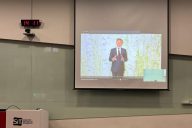Research managers and associates (RMAs) play a pivotal role in simplifying administrative processes, promoting ethical research, and enhancing research productivity for researchers. In this blog we highlight the evolving role of RMAs, the challenges and skills of RMAs, and the importance of recognizing and upskilling professionals in various areas in the research, development, and innovations (RDI) field. We also emphasize the significance of networks like EARMA and EU initiatives to support RMAs.
Currently the greatest challenges the RMAs perceive are the recognition of the profession, AI, increasing competition of funding, and complexity of the professional landscape. The needed future skills include flexibility, resilience, communication, multitasking, and empathy. This was surveyed during the European Association for Research Managers and Associates (EARMA) annual conference in Prague in April 2023, with 1400 participants.
Evolving roles and needed skills of research managers and associates
RMAs play a crucial role in supporting and facilitating research activities within research performing organizations. Many studies show that RMAs are valuable in simplifying administrative tasks, providing resources, and offering comprehensive support to researchers, enabling them to focus on their research while navigating the complexities of the research landscape. This support enhances the quality of research, efficiency, and effectiveness of research activities within institutions (1).
Moreover, these identified skills as well as major challenges are largely also on the agenda of the EU. To strengthen the EU’s position in the global RDI landscape, the European Commission introduced a common European Research Area (ERA) in 2000. This New ERA was adopted by the European Council in 2021, also putting forward the first ERA policy agenda with 20 action points to address the current challenges Europe is facing (2). One part of this policy agenda is Action 17, which addresses the strategic capacity of Europe’s public research performing organizations (including universities, universities of applied sciences, research centers etc.) (see also EARMA, 2023). The aim of the action is to strengthen the European area in the global research landscape, and, in practice, this means that the EU wants to respond to and develop solutions for the issues that research managers and administrators (RMAs) in Europe face. Important for us is that Finland, among 14 other member states, has announced its support for this action.
Addressing European-wide RDI challenges with strategic actions
As a response to challenges, the European Commission envisions building strategic capability of RMAs in four key areas: (1) upskilling, (2) recognition, (3) networking, and (4) capacity building. This will be facilitated by existing RMA communities and organizations, such as EARMA (3).
In addition, two EU-wide development projects have been initiated: the RM Roadmap (earma.org) and the CARDEA Horizon Europe projects (ucc.ie). The European Commission coordinates the existing projects, aligns the initiatives on the European level and provides funding together with the Member States for activities on a national level. In Finland, the national organization Finn-ARMA (Finnish Association of Research Managers and Administrators) is taking forward the initiatives by the RM Roadmap project.
We can think of at least three reasons why this is a critical development of both from the institutional perspective as well as individual level.
From the institutional perspective this provides better opportunities to facilitate securing the talented RMA professionals in their ever challenging and demanding roles through better recognition of the profession and providing diverse professional opportunities for them – the role of RMAs is a critical but often invisible intermediary between science and administration (4).
Moreover, funding to facilitate capability building of RMAs will be available to facilitate the development of activities at the research organizations. And finally, providing upskilling and training in a coordinated manner at the European level benefits especially small institutions, such as Laurea, Metropolia and Haaga-Helia, as we have less internal resources for training of staff.
From the individual perspective, this provides a better opportunity for all professionals involved in RDI to formally get recognized and merited for the critical and highly demanding work that RMAs, such as Specialists, Coordinators, Project Managers, Grant writers, and Data and open science experts do. Moreover, this also encourages the professionals to get involved in networks, such as EARMA to meet fellow colleagues and to engage in professional development activities. As universities of applied science are still fairly small and young in terms of RDI activities, these communities and networks provide an excellent opportunity for knowledge sharing and learning from peers.
And finally, soon there will be a number of training and upskilling activities provided for the professionals, facilitating professional development. As an example of bringing the developmental aspirations into practice, in Haaga-Helia, profile streams have been identified and developed for RMAs. The focus of the experts can be in RDI support (with special focus e.g. on open science, PM knowledge), EU affairs, or research development. Experts can be hired as a Specialist or Senior Specialist.
Finnish Universities of Applied Sciences’ impactful collaboration
In the Finnish capital region, 3UAS alliance with universities of applied sciences Haaga-Helia, Laurea and Metropolia, we are working together to facilitate the achievement of ever growing impactful RDI objectives of Finland. The parliamentary research and development working group has outlined the goals of raising the level of spending on research and development to four percent of gross domestic product by 2030 (5).
In order to succeed in this, we need to for example
- encourage collaboration between academia, industry, and government to foster innovation and knowledge transfer.
- promote partnerships, joint projects, and knowledge-sharing.
- to participate in international research collaborations and programs to leverage resources and share expertise.
Authors
Maarit Haataja works as R&D Manager at Metropolia University of Applied Sciences. Maarit has a doctorate in biology and has worked for the past 25 years in the fields of research, research funding, business cooperation, research impact and as a supervisor.
Virpi Turkulainen works as Head of Research Services in Haaga-Helia University of Applied Sciences. She has a doctorate in industrial management and has worked in research and higher education for 20 years in Europe, USA and Asia.
—
EARMA is the European Association for Research Managers and Administrators and the main European organization for research managerial and administrative professionals. This year’s EARMA Conference took place in Prague, in the Czech Republic, April 24-26, 2023. Over 1400 participants gathered in a Prague Congress Centre. The conference provides an opportunity to network, share best practices, and connect with research managers and administrators from all over the world.
References
- Andersen, J., Toom, K., Poli, S., Miller, P.F. (2017). Research Management Europe and Beyond, Elsevier, 378 pp.
- European Commission (2021). European Research Area Policy Agenda – Overview of actions for the period 2022-2024 (PDF).
- EARMA (2023). Action 17 and its potential for the RMA community (earma.org)
- Santos, J.M.R.C.A., Varela, C. & Kerridge, S. (2021). Professionals at the interface of science: is there more than meets the eye? Perspectives: Policy and Practice in Higher Education, 25:3, 100-105.
- Valtioneuvosto (2023). Tutkimus- ja kehittämistoiminnan rahoituksen käyttöä koskeva monivuotinen suunnitelma: Parlamentaarisen TKI-työryhmän 2022 loppuraportti (PDF). Valtioneuvoston julkaisuja, 2023:13, 70 pp.









Ei kommentteja